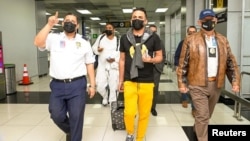El Salvador on Wednesday said it allowed two Cuban journalists to enter the country after the reporters said they were expelled from the Communist-run island and then barred from entering Nicaragua.
Hector Valdez and Esteban Rodriguez, reporters for independent news website ADN Cuba, said on social media that they arrived at El Salvador's main international airport on Tuesday night. They intended to board a flight to Nicaragua but were told authorities in Managua had prohibited their entry.
Neither Nicaraguan nor Cuban authorities responded to requests for comment.
Valdez and Rodriguez were associated with the San Isidro Movement, a group of a few dozen artists, writers and activists that had for years protested restrictions in Cuba on civil liberties.
Rodriguez was arrested in April, he said, following a protest in support of jailed San Isidro leader Luis Manuel Otero Alcantara, who was on a hunger strike at the time.
Cuba's government has previously accused some of the San Isidro group, including Otero Alcantara, of being mercenaries for the United States. Most of its members have now either left Cuba are under house arrest or in jail.
On Wednesday morning, José Miguel Vivanco, executive director of the Americas division of Human Rights Watch, asked the governments of the region to offer asylum to the two journalists, saying they had been persecuted and expelled by Cuba.
Hours later, top Salvadoran migration and human rights officials met the two journalists at the San Oscar Romero International Airport, around 40 km (25 miles) outside of San Salvador.
"Foreign journalists have been admitted to El Salvador while they receive humanitarian assistance, and their migratory situation is resolved," the General Directorate of Migration said on Twitter, adding that the country will support them with accommodation and food.
The alleged expulsions follow a turbulent 2021 in Cuba.
The largest protests since Fidel Castro's 1959 revolution erupted in Cuba in July amid an economic crisis and surge in COVID-19 infections.
Thousands of people protested, angry over shortages of basic goods, curbs on civil liberties and the handling of the pandemic. Hundreds were arrested.
The U.S. Embassy in Havana, which has previously criticized Cuba for stifling protests, said on social media it was concerned about the "exile" of the two reporters, calling it a violation of basic human rights.
"This is another method of harassing journalists … they should never have been repressed and they should not have been forced out of Cuba," the embassy said on Twitter.
The Cuban government has accused the United States of stoking unrest by underwriting protest movements on the island, as well as backing independent media outlets, a claim Washington has denied.





